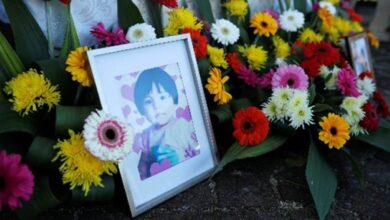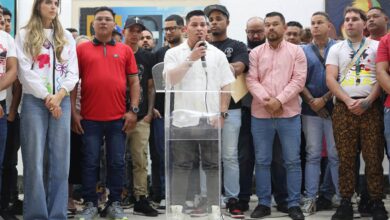The vice president of El Salvador once again resumed the regional integration proposal but with governments in Central America that are unwilling to give up autonomy

Photo: TW-DigitalGovernment
LatinAmerican Post | Moises Campos
Listen to this article
Leer en español: Bukele propone una Unión Europea en Centroamérica
Last Monday, August 22, the vice president of El Salvador, Félix Ulloa, made the proposal for the Central American union. The event took place in a hotel in the city of El Salvador, where different government officials, representatives of international organizations, speakers, regional constitutionalists, and ambassadors from different countries met.
The participation of Vice President Ulloa encouraged the different sectors of Central America to join the union process. During the presentation speakers insisted on the need to "achieve the dream of regional integration". With this, certain objectives were established, among which are:
- Deepening of Central American integration from an inclusive model with institutions based on the region.
- Strengthening of the current institutional structure. This reflects on the bodies of institutions where functional transformation is achieved.
- Promoting debate in favor of the challenges and opportunities in economic, environmental, and political integration and promote human development.
The reform of a Central American constitution.
The initiative of the union of Central America will contemplate, initially, the eight countries that are part of the Central American Integration System (SICA). These are the following countries: Belize, Costa Rica, Panama, El Salvador, Nicaragua, Honduras, the Dominican Republic, and Guatemala. Each of these representatives participated in the conference on the future of Central America.
This organization would be formed through the Union council. It would be made up of the heads of state of the member countries. It would also have a parliament and court, a council of ministers, commission, and other institutions as base columns in the union.
How feasible is the Central American union?
Since 1991, with the signing of the Tegucigalpa protocol, the countries of Central America have tried to advance towards the reform of SICA. Among its objectives was that all Central American countries have democratically elected, civilian governments with high legitimacy.
Also read: El Salvador: How Effective Has Nayib Bukele's Anti-violence Strategy Been?
After more than 30 years and after the difficulties of governability and the stabilization of the political system, the forms of government face new challenges. Challenges that go hand in hand with the effectiveness of governments, rule of law, and corruption.
Although systems such as the European Union maintain sovereignty in democratically common decisions, in Central America governments must make great efforts to strengthen democratic systems.
Previously, SICA took these risks and challenges, however, until now, there have been difficulties. Although Ulloa states that, more than integration, it would be the union of Central America.
Within the document that would allow the discussion, it is indicated that the Central American Union will be a supranational regional organization. It would maintain its own legal personhood and it would have an economic, political, and fiscal scope that will allow for democratic security.
However, currently, certain countries in the Central American region have found themselves involved in internal conflicts that would make it difficult for an organization such as the European Union to exist. Among these difficulties are corruption, political persecution, and accusations of human rights violations.
Persecuted politicians in Nicaragua
For several years now, several Nicaraguan political opponents and priests have claimed to have been persecuted. These actions have been carried out under the mandate of the government of President Daniel Ortega. Police officers were reportedly dispatched to the temples of the priests.
Recently, the case of Monsignor Rolando Álvarez became known. The monsignor has been known to criticize, in homilies, the current administration of Managua.
The persecution by the police has already lasted a full week. Lately, when going to carry out errands, he would have been persecuted by the police forces. After these actions, he chose to take shelter in the churches closest to Managua.
In the current temple in which he takes refuge, he has begun a hunger strike. This action was intended to guarantee his safety.
In the last week of May, the story of the priest Harving Padilla, the leader of a church located in the city of Masaya, became known. The priest advocated using a "parish for prison" since the police were located outside the temple preventing him from carrying out daily actions.
Padilla mentions “they persecute the Catholic Church. They do not only attack priests, since the objective is to silence the church in the priestly and pastoral service that we carry out.”
Is Guatemala still plagued by corruption?
The union of Central America could have repercussions within the actions taken by each state. Democratic relations could be affected by the constant interference between States belonging to the Union of Central America.
In early March, new accusations against Guatemalan President Alejandro Giammattei were made public. New arrest warrants were issued from the attorney general's office to Giammattei officials. Consuelo Porras, the attorney general, had been under constant investigation to bring to light the actions of the president and his officials.
The issue of democracy in Guatemala is hanging by a thread. Necessarily, the relations that can be established in favor of the Union of Central America could be compromised by the individual actions of the countries.
Currently, the United States and Europe are putting pressure on the Giammattei government. These actions place Central America in the spotlight of the international community and others.
In addition to these two current crises. Xiomara Castro meets the challenges of the institutional crisis and organized crime in Honduras; Nayib Bukele continues to try to put pressure on the powers that restrain him within El Salvador; Guatemala does not go unnoticed in Central America and the challenges they face are urgent and serious in terms of corruption
The future of the Central American Union
Things are not looking good for the Central American Union. Each country finds itself with certain vicissitudes to handle. A body with supranational power that enforces laws in favor of human rights, anti-corruption, and democracy would be valuable for citizens, but unattractive for the governments and regimes that currently govern in Central America.




